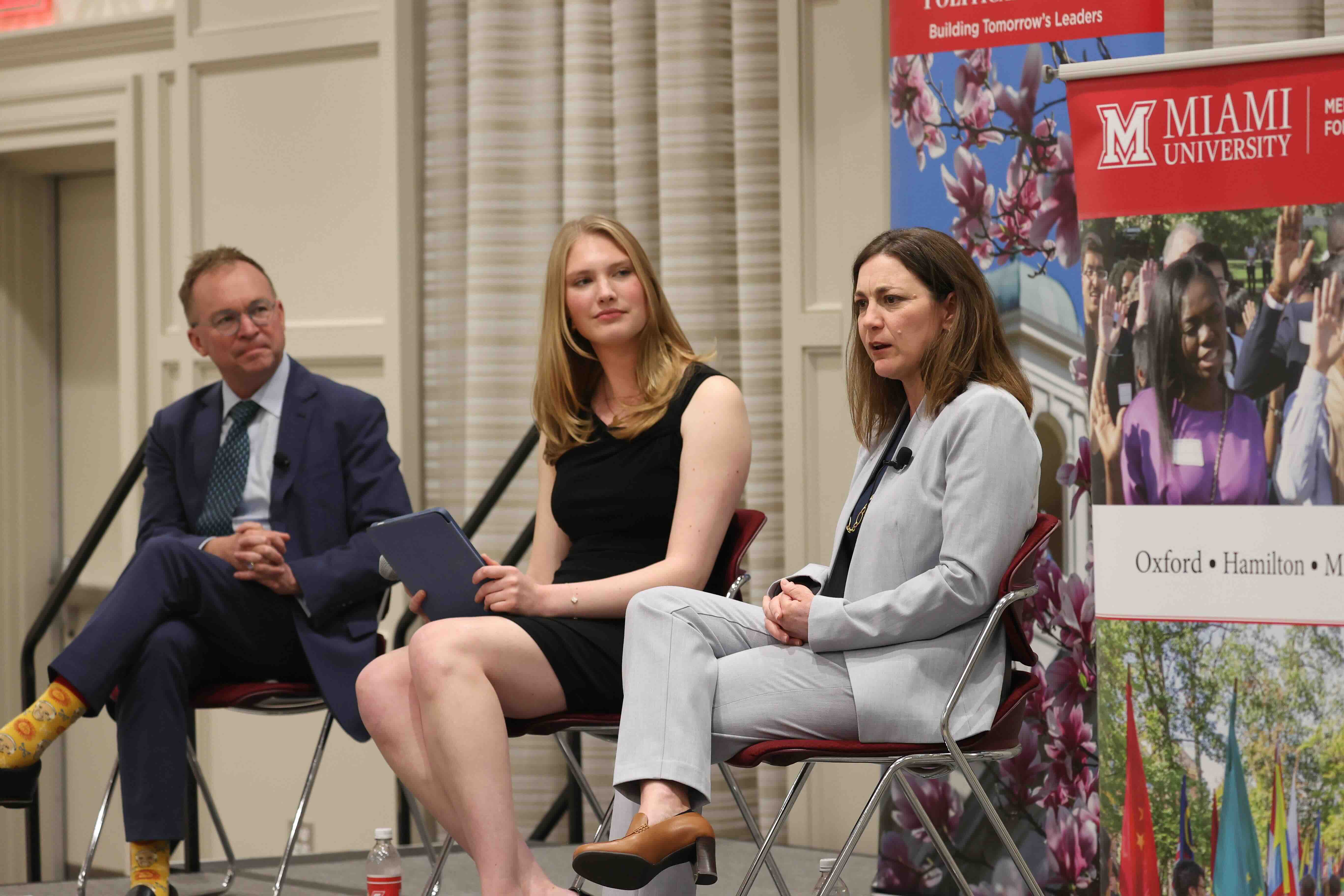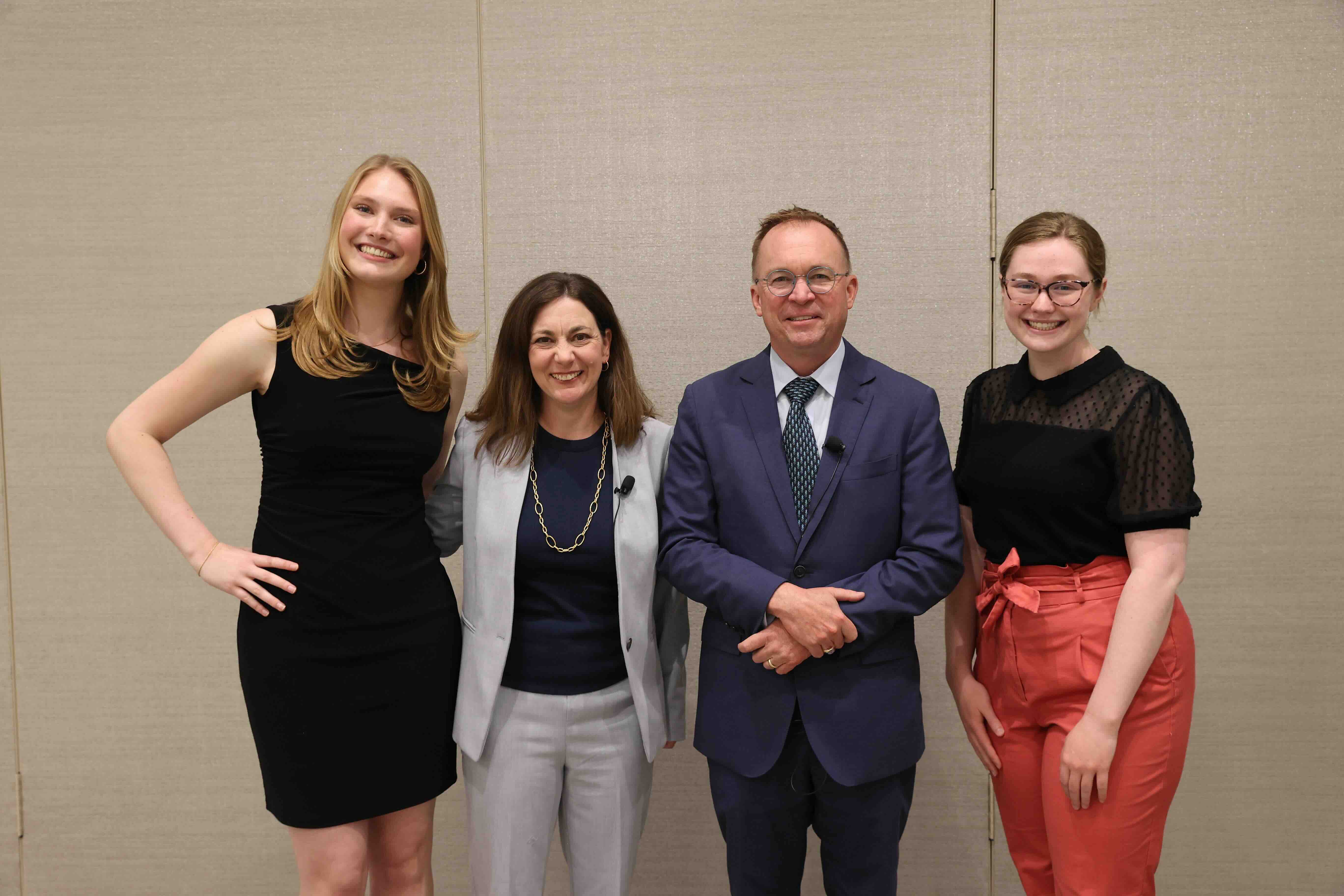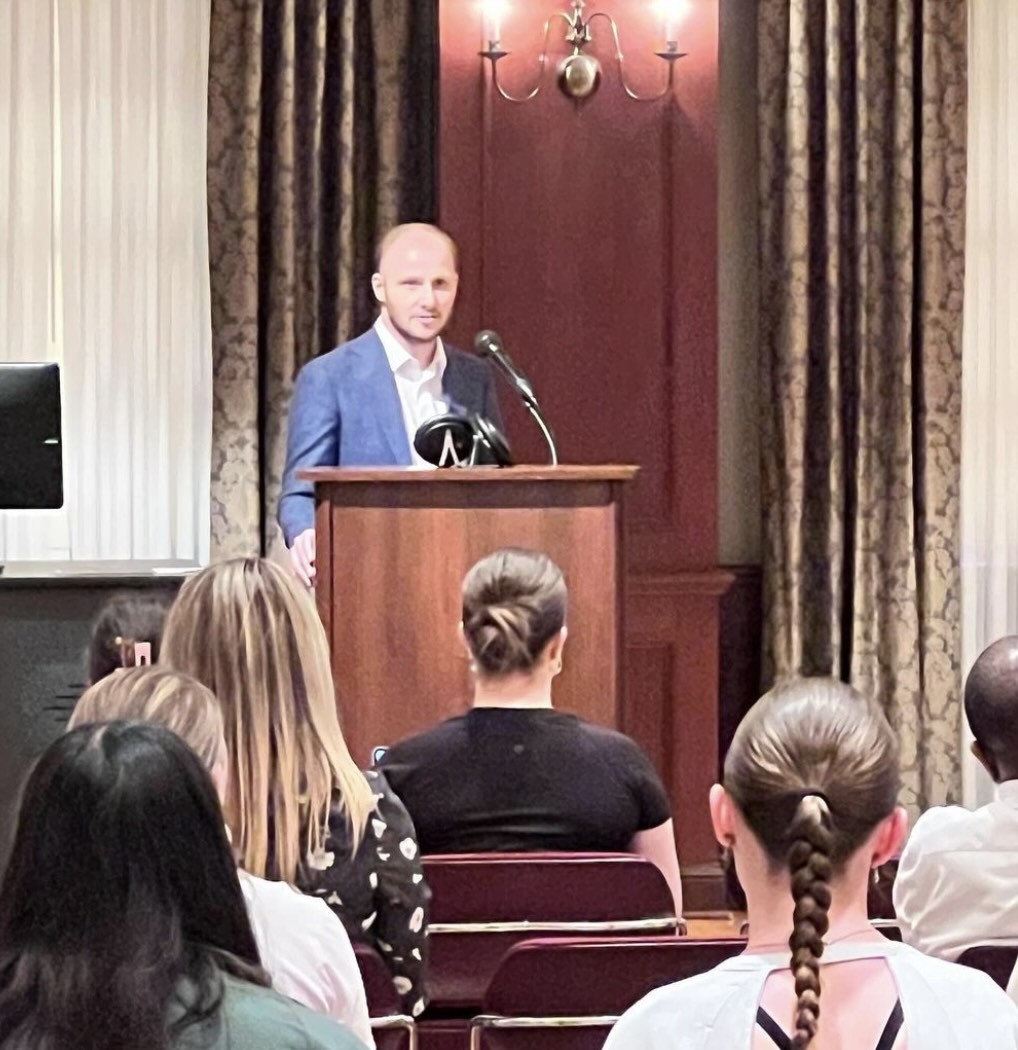Janus Forum and Darrell West Lecture focus on American election integrity, impact, and data
Mick Mulvaney, Trump’s former chief of staff, and Tiffany Muller, president of Let America Vote, discussed the impacts of Citizens United on the upcoming election, while Tyler Sinclair ‘13 highlighted the differing responses in presidential polling.

Janus Forum and Darrell West Lecture focus on American election integrity, impact, and data
In preparation for the upcoming presidential election, Miami University hosted two speaking events that brought three different experts on American elections to Oxford.
For the biannual Janus Forum on April 15, Mick Mulvaney, chief of staff to former President Trump, and Tiffany Muller, president of End Citizens United and Let America Vote, debated the influence big money has on American elections.
The following day, the Department of Political Science invited Tyler Synclair ‘13, founder of TGS Insights and former chief research officer for the Morning Consult, to speak at the Darrell West Lecture In American Politics: “Issues, Opinions and Data Driving the Election.”
Bought and Paid For? Money, Speech, and Elections in America

Janus Forum student president Cameron
Tiefenthaler
Mulvaney and Muller met from opposite sides of the Janus Forum stage to discuss how “big money” influences American politics. Muller opened the debate by explaining what her role entailed.
“Our mission is really simple – we are trying to get ‘big money’ out of politics,” said Muller. “Our members are united behind the belief that if your voices are heard in our political system, then real change is possible.”
Mulvaney responded by addressing the idea that money equals corruption. He said that this is not accurate and Washington is not broken.
Student moderator Grace Gaston, a junior Political Science, Individualized Studies, and Gender Studies major, guided the two guests through a series of questions, beginning with how financing laws impact integrity in governmental processes.
Mulvaney discussed what the 2010 Citizens United decision, a Supreme Court case that overturned restrictions on independent expenditures by corporations in government campaigns, meant to him as a congressional candidate.
“I ran four times, and let me tell you what Citizens United did for me – not a thing,” said Mulvaney. “It doesn’t impact how I run a race.”
Muller countered by discussing the first two questions an individual must consider when running for office: how much money can be raised and if the candidate has the ability to take 18 months off work.
“This is why we end up with a Congress that doesn’t represent America,” said Muller. “50% of them are millionaires, and it is disproportionately male, white, and old.”
Both guests then debated what measures can be taken to reduce the amount of “big money” in politics, the influence of foreign money in US elections, and the concern surrounding AI-generated “deep fakes” in American elections.
“This might be a place in which we agree,” said Muller. “The use of AI is of great concern for election security. Both sides have some concerns, and I hope that we can address and have some steps taken.”
Kirsten Osteboe, a sophomore Diplomacy and Global Politics major, felt that she benefited greatly from attending the debate and appreciated that the discourse was lighthearted and respectful.
“It was a really productive conversation in which both individuals were unafraid to agree with each other when it comes to topics that are harmful to our political system,” said Osteboe. “This topic is highly controversial [in the next election], and it was really important to hear two sides of the topic to understand the role it plays in politics.”
The Janus Forum, through the Department of Political Science and the Menard Family Center for Democracy, aims to bring experts to debate important issues for the sake of increasing civil literacy among Miami students, allowing them to form their own opinions on current issues.
The next Janus Forum will be hosted during the fall of 2024. Students interested in getting involved can contact Grace Gaston at gastongm@MiamiOH.edu or Minnie Warfield at warfiemc@MiamiOH.edu.
Analyzing the importance of data concerning elections and current issues
 This year’s Darrell West Lecture, featuring Tyler Sinclair ‘13, was part of a series of events celebrating the Department of Political Science’s 100-year anniversary.
This year’s Darrell West Lecture, featuring Tyler Sinclair ‘13, was part of a series of events celebrating the Department of Political Science’s 100-year anniversary.
“The Darrell West Lecture in American Politics series is designed to bring political issues and policies in front of our students so they can think critically about them,” said Bryan Marshall, professor and chair of the Department of Political Science. “That way students can be informed and consider solutions that make a meaningful difference in the future.”
Sinclair sought audience participation from the start by opening with a knock-knock joke. His goal, he explained, was to share the importance of basic statistical literacy in politics, which he learned as a Miami student.
He asked students, through a show of hands, to share what they thought about the performance and favorability of the 2024 candidates, President Joe Biden and Donald Trump. He then provided data collected through various polls about the favorability of former presidents, specifically starting from January of their re-election year.
Through comparing different survey responses from various polls like you.gov and Gallop, Sinclair was able to highlight differences in responses.
“Minor changes in wording can elicit different responses on how folks view the issue,” Sinclair said.
He also explained that whether or not the survey has answer choices to select from and what those choices are can sway how people respond.
“When folks are not given a chance to say ‘unsure,’ it could mean a lot of different things,” he said. He added that it is difficult to say with 100% confidence that data shows specific things when it comes to self-reported answers. Respondents can be swayed to answer a certain way, may not have a strong opinion, or overreport what they think.
“During election season, a lot of information and stats are being thrown out by the media,” Sinclair said. “There are going to be a lot of headlines we won’t have time to think critically about leading up to the election, so it is important to know how to decipher what is reliable and statistically significant.”
Sinclair finished his talk by allowing questions from the audience. Through his use of examples and explanations of data, students were able to walk out of the lecture with more knowledge about data and its importance, particularly when it comes to how elections play out.
“In general, I think folks anticipate a close 2024 contest much like 2020, in many of the same states, and for many of the same reasons,” Sinclair said.